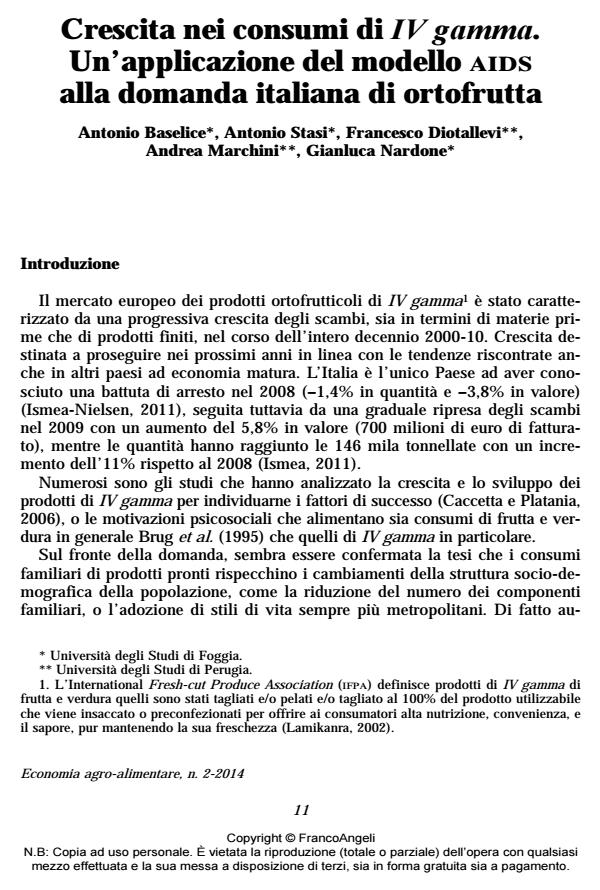Growth in the consumption of fresh-cut produce. An application of AIDS model to the Italian demand for fruit and vegetables
Journal title ECONOMIA AGRO-ALIMENTARE
Author/s Antonio Baselice, Antonio Stasi, Francesco Diotallevi, Andrea Marchini, Gianluca Nardone
Publishing Year 2014 Issue 2014/2
Language Italian Pages 20 P. 11-30 File size 128 KB
DOI 10.3280/ECAG2014-002002
DOI is like a bar code for intellectual property: to have more infomation
click here
Below, you can see the article first page
If you want to buy this article in PDF format, you can do it, following the instructions to buy download credits

FrancoAngeli is member of Publishers International Linking Association, Inc (PILA), a not-for-profit association which run the CrossRef service enabling links to and from online scholarly content.
Fresh-cut and ready to eat products are gaining market shares over fruits and vegetables. Dining habits and cooking time are changing over time and life styles are modifying the food preparation and the time used for eating. In the meanwhile, prices could be playing an important role in the substitution between fresh products and ready-to-eat alternatives. Therefore, the present paper tests the following hypotheses: - measuring the direct price effect on ready-to-eat and fresh cut product in order to verify market stability and price war probability; - measuring the substitution effect between fresh and ready-to-eat categories; The hypotheses have been verified throughout the estimation of a la/aids model that considers a system of 10 equations. The data used for the analysis have been collected by iri-Infoscan and represent the total Italian grocery sales for the years 2008-2010. Results provide evidence that the market is price sensitive and that substitution effect is negligible. Therefore, past, present and future evolutions of fresh-cut and ready-to-eat products should be attributed to price wars. Promotional activities, private label strategies and other price reduction strategies could be winning strategies in order to gain market shares within fruits and vegetable market.
Keywords: Quarta gamma, modello aids, ortofrutta, sostituzione, stagionalità
Jel codes: C32, D12, Q13
- Quality of fresh‐cut products as affected by harvest and postharvest operations Francisca A Ansah, Maria L Amodio, Giancarlo Colelli, in Journal of the Science of Food and Agriculture /2018 pp.3614
DOI: 10.1002/jsfa.8885
Antonio Baselice, Antonio Stasi, Francesco Diotallevi, Andrea Marchini, Gianluca Nardone, Crescita nei consumi di IV gamma. Un’applicazione del modello AIDS alla domanda italiana di ortofrutta in "ECONOMIA AGRO-ALIMENTARE" 2/2014, pp 11-30, DOI: 10.3280/ECAG2014-002002